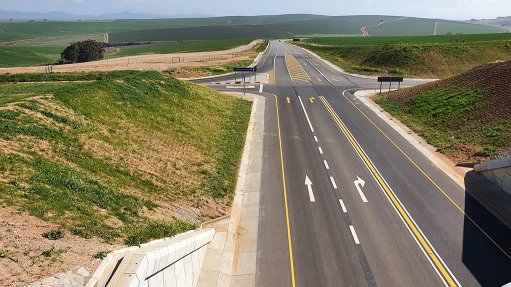Science, Innovation dept envisions a solid hydrogen economy by 2050
South Africa’s Department of Science and Innovation (DSI) views hydrogen as a key enabler of decarbonisation, particularly in the transport sector – heavy-duty trucking, shipping, aviation, and rail – and in major polluting industries such as steel, cement and chemicals manufacturing, as well as mining.
The DSI is working on multiple catalytic projects in the green hydrogen space, with the aim of starting small-scale electrolysis manufacturing and piloting at least 1 MW of green hydrogen production before 2024.
By 2050, government aims to have established an inclusive, competitive and sustainable green hydrogen economy. To this end, it has various policies that support the development of green hydrogen, including the Hydrogen Society Roadmap which was published in February.
DSI technology and innovation acting deputy director-general Dr Rebecca Maserumule says the department hopes to facilitate the conversion of at least 100 buses and trucks to green hydrogen, and convert at least 20 forklifts to fuel cell power, by 2025.
Other ambitions include demonstrating fuel cells at work in public buildings and in power generation applications.
Government’s overall targeted outcomes with its hydrogen efforts include harmonising standards and removing barriers to business, mitigating investment risks, promoting research, development and innovation, implementing strategic deployment projects, supporting skills development and creating public awareness, and supporting demand creation.
The DSI also intends on cementing long-term policy signals.
Masemurule says there will be 5 GW of electrolysis capacity under construction in the Northern Cape between 2025 and 2030, and 10 GW of electrolysis capacity fully deployed by 2030.
By this time, there should also be at least 500 buses and trucks powered by green hydrogen on the roads and 20 000 jobs in the hydrogen economy.
Between 2030 and 2040, Masemurule believes electrolysis capacity will likely increase to at least 15 GW in South Africa for use in the transport, industry and power sectors.
Among government’s catalytic projects in the hydrogen space is the Platinum Valley Initiative (PVI), which has its origins in an agreement between diversified miner Anglo American South Africa, and energy companies Bambili Energy and Engie.
DSI hopes to see 1.7 GW of electrolyser capacity deployed as part of the PVI by 2030.
Masemurule says green hydrogen demand in the valley could reach up to 185 000 t by 2030. The nine catalytic pilot projects envisioned as part of the PVI will cost about $1.2-billion to implement.
The PVI is modelling hydrogen demand and supply across three hubs: Mogalakwena, in Limpopo; Rustenburg, in North West; and Durban, in KwaZulu-Natal. The hubs all have rich sources of hydrogen demand, owing to either mining truck conversion, industries switching from using grey hydrogen as a feedstock for production, or where there is a heavy freight corridor and port activities.
Masemurule says each hub has its own demand and supply potential as well as drivers and barriers for localised green hydrogen production.
Moreover, DSI is conducting a joint study alongside the Limpopo Economic Development Agency on a Limpopo Science and Technology Park, which involves hydrogen fuel cells powering data centres that will be installed at the park.
DSI is also supporting the CoalCO2-X research programme, which aims to use renewable or green hydrogen and pollutants such as carbon dioxide and other greenhouse gases contained in the flue gas from coal-fired boilers to make value-added products.
A number of initiatives have been earmarked particularly in Boegoebaai, in the Namakwa Special Economic Zone, in the Northern Cape. This includes an electrolyser park, which will see a range of anchor investors with appropriate electrolyser technologies bid for inclusion, with the successful bidder being tasked to build facilities.
The Boegoebaai development will house a desalination plant and a green ammonia production plant, as well as a “Gigafactory” which is a dedicated manufacturing site for electrolysers.
Petrochemicals giant Sasol has partnered with national and local government in the area to finalise the location and development of the Boegoebaai plants.
Meanwhile, Masemurule says that, in a net-zero scenario, hydrogen and hydrogen-based fuels are expected to contribute more than 25% of total transport energy demand by 2050, up from 2.6% in 2030. This scenario will see more than 15-million fuel-cell electric vehicles on the road, mostly in the light-duty vehicle segment.
So far, hydrogen fuel cell vehicles have only been demonstrated in mining locomotives, golf carts, forklifts and scooters.
DSI acting deputy director-general Dr Rebecca Masemurule presented the department’s hydrogen plans during the South African Heavy Haul Association conference, hosted from August 2 to 4, in Boksburg.
Comments
Press Office
Announcements
What's On
Subscribe to improve your user experience...
Option 1 (equivalent of R125 a month):
Receive a weekly copy of Creamer Media's Engineering News & Mining Weekly magazine
(print copy for those in South Africa and e-magazine for those outside of South Africa)
Receive daily email newsletters
Access to full search results
Access archive of magazine back copies
Access to Projects in Progress
Access to ONE Research Report of your choice in PDF format
Option 2 (equivalent of R375 a month):
All benefits from Option 1
PLUS
Access to Creamer Media's Research Channel Africa for ALL Research Reports, in PDF format, on various industrial and mining sectors
including Electricity; Water; Energy Transition; Hydrogen; Roads, Rail and Ports; Coal; Gold; Platinum; Battery Metals; etc.
Already a subscriber?
Forgotten your password?
Receive weekly copy of Creamer Media's Engineering News & Mining Weekly magazine (print copy for those in South Africa and e-magazine for those outside of South Africa)
➕
Recieve daily email newsletters
➕
Access to full search results
➕
Access archive of magazine back copies
➕
Access to Projects in Progress
➕
Access to ONE Research Report of your choice in PDF format
RESEARCH CHANNEL AFRICA
R4500 (equivalent of R375 a month)
SUBSCRIBEAll benefits from Option 1
➕
Access to Creamer Media's Research Channel Africa for ALL Research Reports on various industrial and mining sectors, in PDF format, including on:
Electricity
➕
Water
➕
Energy Transition
➕
Hydrogen
➕
Roads, Rail and Ports
➕
Coal
➕
Gold
➕
Platinum
➕
Battery Metals
➕
etc.
Receive all benefits from Option 1 or Option 2 delivered to numerous people at your company
➕
Multiple User names and Passwords for simultaneous log-ins
➕
Intranet integration access to all in your organisation


















